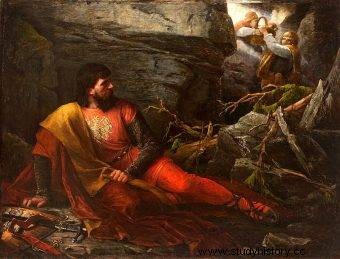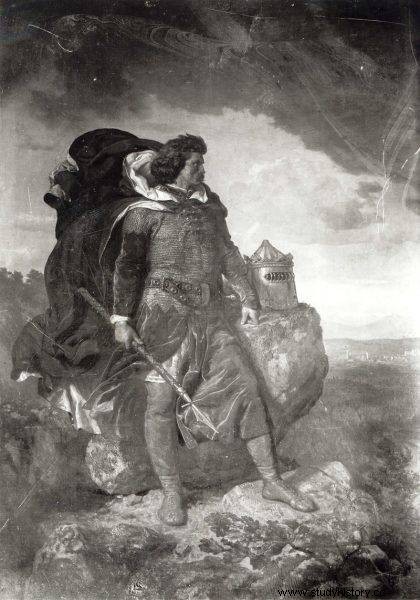Let us remind you how it happened that a lesser prince got to the top and declared war on the Teutonic Knights.
Władysław Łokietek was the first son of Kazimierz I Kujawski from his second marriage to Eufrozyna Opolska, but as the third son he was not even considered as heir, let alone pretender to the Polish throne! What's more, after the death of his father, he was only 7 years old and he probably would not have received anything from the inheritance if it were not for his mother, who wanted to provide her children with as many schemas as possible after her father. In this way, it took over the regency over Brześć Kujawski and the lands of Łęczyca and Dobrzyń.

It is possible that in her plans she even wanted to poison Kazimierz's offspring from her first marriage. But if she really had such plans, they were never realized. Eufrozyna quickly began to struggle with the invasions of Lithuanians and the reluctance of the neighboring Mazovia. The Teutonic Knights also began to make their plans for its lands. All this meant that she entrusted herself to the care of Bolesław the Chaste and Bolesław the Pious, two of the most powerful Piasts at that time, occupying the Kraków and Sandomierz lands and Wielkopolska respectively.
Prince "madman"
Władysław was not famous for his authority, strong personality or self-control. He also had no particular features of appearance that would help him achieve his later goals. He was described more as greedy, selfish and prone to bravado. He had a heavy character and thus deserved all sorts of nicknames.
Paweł Jasienica called him a "croak". The nickname "Łokietek" was given to Władysław in his childhood - because of his short stature. It is commonly believed that it was this trait that influenced the fact that the nickname stuck to him permanently.

The nickname "Łokietek" was given to Władysław in his childhood - due to his short stature.
However, much more plausible is the interpretation that the nickname stuck to him mockingly. For if we compare the sarcophagi of Władysław and Casimir the Great, it turns out that they do not differ much in size. The elbow was therefore not as low as we would like to see it. Therefore, "Elbow" is rather a proof of disregard for Władysław in the initial period, when his aspirations seemed impossible to fulfill for everyone.
In 1273 Władysław Łokietek was sent to the court of Kraków, where he assumed the role of the personal page of Bolesław the Chaste. It is not fully known why this happened - whether it was because of the mother or as an enhancement of the majesty of Bolesław. Nevertheless, Łokietek was in the most important place for Poland at that time. It was here that his passion and drive for power could awaken in him, which grew stronger with time and led him to the crown.
Władysław stayed at the Kraków court full of townspeople and nobles. He watched the influence they had on power. He followed political events. When he was sent back to his homeland to take over the rule of Brześć Kujawski with his brother Kazimierz II, he was certainly a different man.
"The little prince of the little book"
The Duchy of Brest-Kujawy was neither the most important, nor the largest, nor the richest. It also seems that it was not best managed by its new ruler either. At that time, he was convinced that he was "the son of his father," who was known to be prone to strife, war and conflict. This is how Łokietek was described by the then chroniclers:
He was prone to violent actions and incapable of developmental actions. During military expeditions, he allowed his troops to plunder, which won his enemies.
Therefore, the later king of Poland appears in this period as a robber, wicked and selfish. And this patch stuck to him for the rest of his life.

The article was inspired by the newest book by Elżbieta Cherezińska, The Reborn Kingdom, the fifth volume of the best-selling series. The novel has just been released by the Zysk i S-ka publishing house.
In 1281, Leszek the Black, Henry IV Probus, Przemysł II and Henry III of Głogów concluded an agreement in which it was assumed that each of the rulers, if they died childless, would transfer their lands to others. And although Władysław was not even taken into account in these agreements, paradoxically, it was precisely these agreements that brought him closer to the crown.
After the death of Leszek Czarny, Łokietek gained power in the Duchy of Sieradz. But the death of his half brother also had other consequences. Leszek was already sitting on the Kraków throne at that time. After he died, the struggle for who would take his place began. It took place between two contenders:Bolesław II Płock, who was supported by Władysław, and Henryk Probus from Wrocław. The decisive clash took place near Siewierz on February 26, 1289.
The army of Łokietek and Bolesław was victorious, but their army never managed to capture Krakow. Although the war for the Kraków throne was lost, it was a turning point for Władysław Łokietek. From then on, he stopped being treated as an inferior prince, began to build his political base and became a serious player in the fight for the throne.
Takeover of Wielkopolska
In 1290, Henry Probus died, pointing to the Kraków throne of Przemysł II, who concluded an agreement with Władysław Łokietek, leaving the Sandomierz land in his hands. However, political differences broke quickly between the two sides - Łokietek entered into an alliance with Hungary, and Przemysł headed towards Wenceslaus II, the king of Bohemia. After a year he withdrew from the throne of Kraków and handed him over to the Czech Republic.
Obviously, Łokietek did not like such a move. He made an attempt to fight Wenceslaus II, which ended tragically for him. He was deprived of his power in the Sandomierz region and forced to surrender. In order to preserve Sieradz and Kujawy, Władysław had to pay homage to Wacław. However, this did not stop him from making further attempts to oppose his opponent.

Władysław Łokietek in exile
When Przemysł II was murdered on February 8, 1296, Władysław the Short did not wait for his turn. He appeared in Greater Poland and was hailed as the ruler. This was not because he had rights to that area. Prince Henry III of Głogów was to be given to the prince of Przemyśl. However, the situation in the region was so tense and dangerous that the immediate action of Łokietek and the military expedition securing the provincial borders was a sufficient reason to hand over power to the newcomer.
When Henry III reached Greater Poland, claiming the right to power, there was not even a fight. By virtue of the treaty, the lands were divided. Łokietek took over Kalisz, Poznań, Gniezno and Gdańsk Pomerania. Henryk had the area south of Obra. However, Łokietek did not enjoy Greater Poland for too long and lost it to Wenceslaus II, who was crowned in Gniezno in 1300 by Archbishop Świnka. Meanwhile, Władysław fled the country.
In 1304 he returned to Poland to fight for the crown once again. His return took place under circumstances other than his escape. He was supported by the Hungarians and the situation in the country changed. Wenceslaus II was not as popular as before. He did not keep his promises, appointed strangers to offices, took care of his interests, not the good of the country. Therefore, Łokietek was welcomed with the hope that the situation would change.
In the following years, he occupied other territories and won titles until on January 20, 1320, he was crowned King of Poland. In Elżbieta Cherezińska's book, we meet him again in 1327, when his son Kazimierz is plagued by a serious illness, and a great war with the Teutonic Order looms on the horizon.
The article was inspired by the newest book by Elżbieta Cherezińska, The Reborn Kingdom, the fifth volume of the best-selling series. The novel has just been released by the Zysk i S-ka publishing house.
